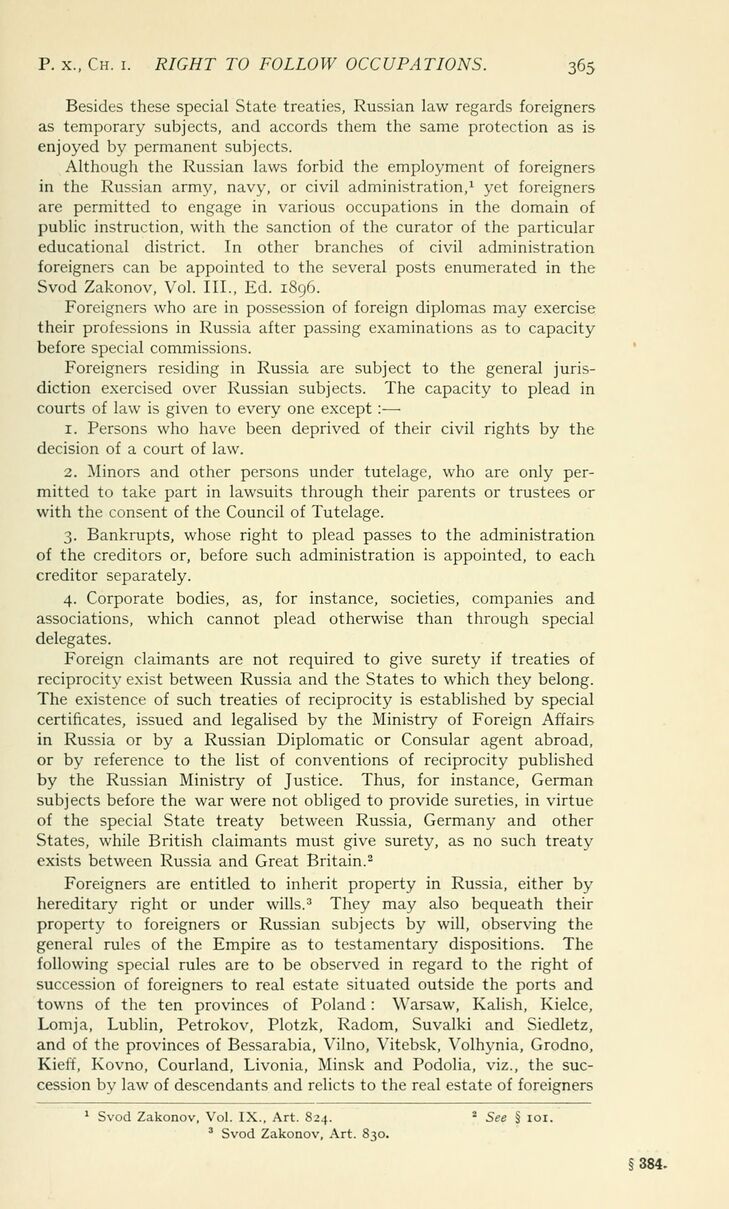
Full resolution (JPEG) - On this page / på denna sida - Pages ...

<< prev. page << föreg. sida << >> nästa sida >> next page >>
Below is the raw OCR text
from the above scanned image.
Do you see an error? Proofread the page now!
Här nedan syns maskintolkade texten från faksimilbilden ovan.
Ser du något fel? Korrekturläs sidan nu!
This page has never been proofread. / Denna sida har aldrig korrekturlästs.
Р. х., Сн. I. RIGHT TO FOLLOW OCCUPATIONS.
Besides these special State treaties, Russian law regards foreigners
as temporary subjects, and accords them the same protection as is
enjoyed by permanent subjects.
Although the Russian laws forbid the employment of foreigners
in the Russian army, navy, or civil administration,1 yet foreigners
are permitted to engage in various occupations in the domain of
public instruction, with the sanction of the curator of the particular
educational district. In other branches of civil administration
foreigners can be appointed to the several posts enumerated in the
Svod Zakonov, Vol. III., Ed. 1896.
Foreigners who are in possession of foreign diplomas may exercise
their professions in Russia after passing examinations as to capacity
before special commissions.
Foreigners residing in Russia are subject to the general
jurisdiction exercised over Russian subjects. The capacity to plead in
courts of law is given to every one except:—
1. Persons who have been deprived of their civil rights by the
decision of a court of law.
2. Minors and other persons under tutelage, who are only
permitted to take part in lawsuits through their parents or trustees or
with the consent of the Council of Tutelage.
3. Bankrupts, whose right to plead passes to the administration
of the creditors or, before such administration is appointed, to each
creditor separately.
4. Corporate bodies, as, for instance, societies, companies and
associations, which cannot plead otherwise than through special
delegates.
Foreign claimants are not required to give surety if treaties of
reciprocity exist between Russia and the States to which they belong.
The existence of such treaties of reciprocity is established by special
certificates, issued and legalised by the Ministry of Foreign Affairs
in Russia or by a Russian Diplomatic or Consular agent abroad,
or by reference to the list of conventions of reciprocity published
by the Russian Ministry of Justice. Thus, for instance, German
subjects before the war were not obliged to provide sureties, in virtue
of the special State treaty between Russia, Germany and other
States, while British claimants must give surety, as no such treaty
exists between Russia and Great Britain.2
Foreigners are entitled to inherit property in Russia, either by
hereditary right or under wills.3 They may also bequeath their
property to foreigners or Russian subjects by will, observing the
general rules of the Empire as to testamentary dispositions. The
following special rules are to be observed in regard to the right of
succession of foreigners to real estate situated outside the ports and
towns of the ten provinces of Poland: Warsaw, Kalish, Kielce,
Lomja, Lublin, Petrokov, Plotzk, Radom, Suvalki and Siedletz,
and of the provinces of Bessarabia, Vilno, Vitebsk, Volhynia, Grodno,
Kieff, Kovno, Courland, Livonia, Minsk and Podolia, viz., the
succession by law of descendants and relicts to the real estate of foreigners
1 Svod Zakonov, Vol. IX., Art. 824.
3 Svod Zakonov, Art. 830.
2 See § 101.
<< prev. page << föreg. sida << >> nästa sida >> next page >>